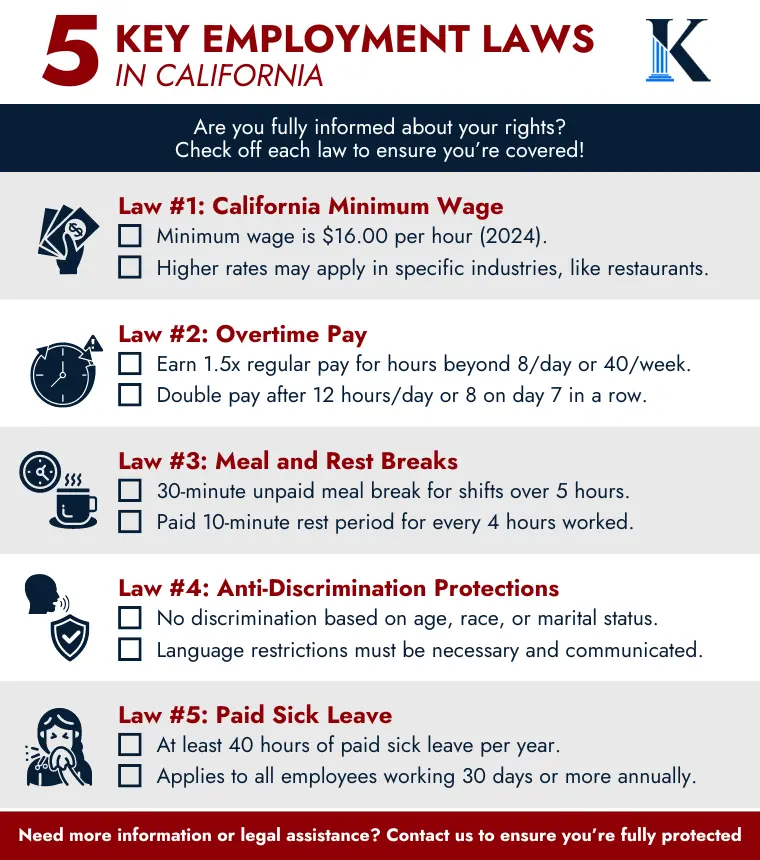Binabayaran ka ba ng tama sa iyong sahod? Nakatatanggap ka ba ng sapat na oras ng pahinga sa trabaho?
Managing issues at work can be challenging, especially when unfamiliar with one’s rights. Many employees struggle to understand the legal requirements of their employment, which can lead to unfair treatment or exploitation.
California’s legal landscape provides vital protections to ensure fair treatment in the workplace. Whether you’re dealing with concerns related to your hourly wage or issues stemming from national origin or sexual orientation, it’s important to understand the employment laws in California.
In this guide, we’ll cover five employment laws you should know to protect yourself and your rights effectively. Keep reading!

Law #1: California Minimum Wage
Did you know that the minimum wage rate can vary depending on where you work? California’s minimum wage for all employers is $16.00 per hour as of January 1, 2024.
However, special rules apply in certain industries. For example, restaurant employees must be paid at least $20.00 per hour.
Remember that minimum wage requirements might differ based on the employer’s size, with specific rates for businesses with 25 or fewer employees than those with more. Additionally, some cities and counties have set their own higher minimum wages.
Understanding these requirements ensures you are fairly compensated according to labor laws. If you have concerns about your pay, consider consulting a labor lawyer in Los Angeles to ensure your rights are protected.
Law #2: Overtime Pay
In California, overtime pay is crucial for fair compensation for additional hours worked.
Employees are entitled to one and one-half times their regular pay rate for any hours worked beyond eight in a single day or 40 in a week. This includes various forms of pay, such as hourly wages, salaries, and commissions, but it must never fall below the minimum wage.
If you work over 12 hours in a day or more than eight hours on the seventh consecutive day, your overtime wages should be double your regular rate. These protections ensure that employee rights are upheld and that overtime laws are fairly applied.
Law #3: Meal and Rest Breaks
Employment laws in California mandate specific break times to ensure workers have adequate time to rest and recharge. Here’s a summary of the key meal and rest break requirements:
- Meal Breaks: Employees working more than five hours daily must receive a 30-minute unpaid meal break.
- Extended Shifts: For shifts longer than 12 hours, an additional 30-minute unpaid meal break is required.
- Rest Periods: Workers are entitled to a paid 10-minute rest period for every four hours worked.
- On-Duty Meals: If a meal break is taken on the job, it must be paid. This arrangement should be agreed upon in writing between the business owner and the employee.
Break laws are part of the employment laws, designed to protect worker rights and ensure fair treatment for everyone, including Fil-Am in California.
Law #4: Anti-Discrimination Protections
California has strong protections in place to prevent discrimination in the workplace. Here are 5 points every Fil-Am in California should know:
- Employers with five or more employees cannot discriminate based on protected characteristics such as age, race, or marital status.
- Language restrictions at work must be necessary for business and clearly communicated.
- It’s illegal to discriminate against those with a California ID issued to undocumented individuals.
- Religious practices, including attire and grooming, must be reasonably accommodated.
- Employers must provide reasonable accommodations for employees with disabilities.
Law #5: Paid Sick Leave
Under employment laws in California, eligible employees are entitled to at least 40 hours or five days of paid sick leave each year. Employers must comply with the law by offering a plan that meets or exceeds these requirements.
If a local ordinance provides more generous sick leave, the employer must follow the higher standard. This law applies to all employees who work at least 30 days for the same employer within a year, including part-time and temporary workers.
However, certain workers, like retired annuitants and railroad employees, are exempt from this law. You can take paid sick leave to care for yourself or a family member dealing with a medical condition, including preventive care, treatment, or diagnosis.

Huwag Magpabaya sa Iyong Karapatan
Understanding employment laws in California is essential for protecting your rights as a worker. From your first day of employment, knowing these laws can help you navigate your employment relationship and avoid illegal workplace activities.
If you face issues like unpaid hourly rates or need to file a compensation claim, it’s important to take prompt legal action. Consult a labor lawyer in Los Angeles who can guide you through the process.
If you found this information helpful, feel free to share it with others who might benefit from it!




